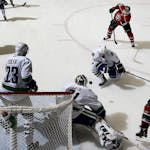 See
more of the story
See
more of the story
Nordy, the Minnesota Wild's mascot, might be out of a job.
What this team needs is not a nondescript furball in a Christmas-tree sweater.
What this team needs is an emotional support animal.
Amid all of the optimism the Wild expressed late Friday night after being eliminated from the first round of the Stanley Cup playoff were these two, telling words:
"Sideshow."
"Stuff."
They were uttered by the Wild's two highest-paid and longest-tenured players, Zach Parise and Ryan Suter.
By definition, and to borrow another of Suter's words, it's "tough" for a franchise to move on from franchise players.
That movement began in the past year under General Manager Bill Guerin and coach Dean Evason. They reduced Suter's playing time. They benched Parise at the end of the regular season and the beginning of the playoffs. That move was probably justifiable internally and may have been for the good of the franchise but wound up looking self-destructive when Parise became one of the best players in the series upon his return.
So by late Friday, Parise was complaining about the "sideshow" and Suter was complaining about all the "stuff going on around here," and now Guerin and Evason have a problem as they try to stamp their playoff loss as a building exercise rather than a chemistry failure.
Parise and Suter have four years remaining on their contracts. Suter remains a solid player. Parise may have revived his trade value, but he did so while demonstrating what his value could be, again, to this franchise.
What does a hockey expert recommend to right the ship?
I have no idea, but I recommend puppies.
And muffins. And those coffee cooler drinks.
Guerin, Evason, Parise and owner Craig Leipold need to go into a room with caffeine and baked goods and therapy dogs and stay in there until they've figured out how to coexist.
Trading Parise would be difficult and probably damaging to the franchise. So it's time for this group of people to recognize that all over the sports world there are difficult personalities and relationships, and while Parise may be a pain in the rear to management, that rear is always in gear on the ice.
As much as modern sports likes to pretend that every team is a family, a lot of these families are dysfunctional. Here's what the Wild needs to remember: Championship teams are usually dysfunctional, too.
Michael Jordan hated the man who built championship teams around him. The Bronx Zoo Yankees fought one another and won for each other. Anyone who believes that everyone on every winning team loves one another has not spent enough time in a locker room.
Parise probably will never forgive his bosses for embarrassing him, and Evason and Guerin might wish they could wish Parise away, but the last four games of the series produced an inconvenient truth:
Parise, when healthy, can still be one of this team's best players. Combine a productive version of Parise with Kirill Kaprizov, Kevin Fiala, Joel Eriksson Ek and presumably Matt Boldy and Marco Rossi, and next year's Wild team could be the first to win a playoff series since 2015.
Maybe the Wild will have to rest Parise regularly to get the most out of him. Why not? The regular season matters little. The NHL, unlike baseball, is a playoff sport.
And in these playoffs, the Wild scored just 13 goals in a seven-game series against Vegas. Parise, while playing in just four of the games, produced three points — two goals from his workshop around the net, and one assist on a breakout pass to Fiala that led to a Ryan Hartman goal.
I'm surprised Parise was so sharp. A year ago, I thought it was time to trade him, but deciding to trade someone and finding the right deal are two different things.
After watching him against Vegas, I think the Wild is stuck with Parise and should find a way to feel good about that.
I'll buy the muffins.




